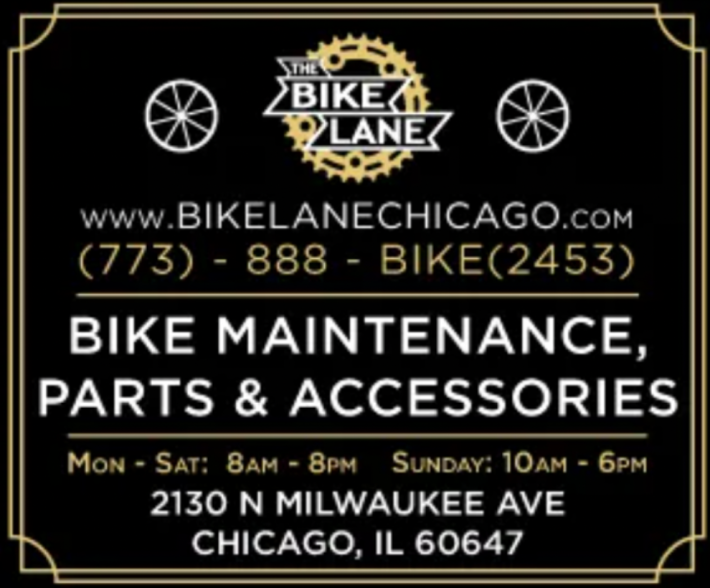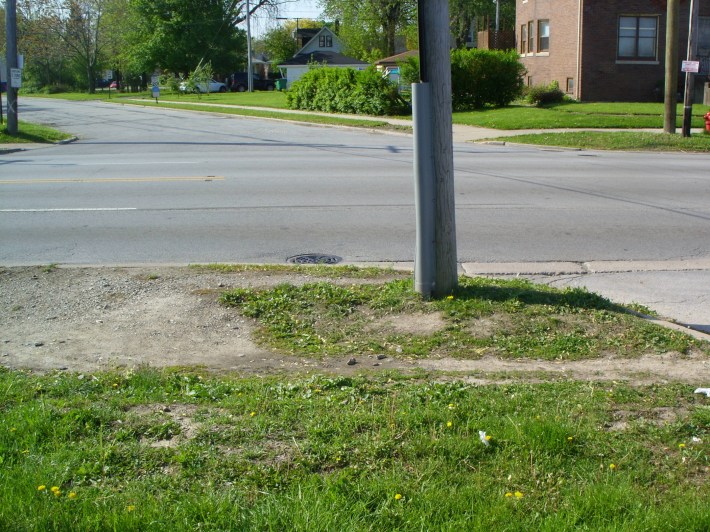
As discussed during the Active Transportation Alliance's recent Chicago Advocate Connect session, they've partnered with the University of Illinois Chicago's Institute of Disability and Human Development on Project Sidewalk. This initiative to document the conditions of local sidewalks and bikeways is offering $300 stipends to 10 participants who will virtually move through city streets using Google Streetview, and document accessibility barriers. We asked ATA for some more details about the program.
Project Sidewalk utilizes a free online tool originally developed by by the University of Washington Makeability lab. The initiative's point people at UIC are Yochai Eisenberg, assistant professor at the College of Disability and Human Development, and KiAnna Mckee-Steen, an associate researcher. The effort uses crowdsourcing to collect data on pedestrian spaces that could use better infrastructure, with the goal of advocating for equitable urban planning that empowers people with disabilities.

"Nearly every person will experience disability at some point in their lifetime," states a Project Sidewalk info video. "As it stands, around 16 percent of the world’s population lives with some form of disability. It’s been over 34 years since the signing of the Americans with Disabilities Act. Yet, barriers persist across the board as many cities have not adequately addressed these accessibility issues. According to a recent study, a staggering 48 percent of sidewalks are not accessible to people with disabilities. Cities face a significant challenge in allocating funding to address accessible infrastructure."
"Project Sidewalk has a proven track record of success, serving various users, including ADA coordinators, community organizations, city planners, educators, and community members," the video states. In Chicago, the 40th Ward, represented by Ald. Andre Vasquez, was able to use Project Sidewalk data to "make better decisions about prioritizing infrastructure spending and alert the appropriate City departments to high-priority accessibility issues."
"We’ve known about Project Sidewalk and their mission to identify barriers in accessibility for a couple of years now," said ATA Director of Community Building and Leadership Maggie Czerwinski. "Their work aligns very closely with our mission at ATA. With the Project Sidewalk team at UIC, we looked into connecting Chicagoland municipalities to the tool as we’ve heard repeatedly that having access to up-to-date data on sidewalk and intersection conditions is incredibly valuable for public works and planning departments. We also learned that while many municipalities were interested in the tool, it’s understandably challenging for them to devote staff time to using Project Sidewalk, given staff capacity and the many tasks staff must prioritize in order to keep a town running."
"This summer, we reconnected with UIC’s Project Sidewalk at the Illinois Walkability Virtual Academy, and that’s where the latest partnership began," Czerwinski added. "The WVA was a ten-week program hosted by the National Association of Chronic Disease Directors where teams from across Illinois came together to learn from national experts in walkability and developed an action plan." The Illinois communities of Broadview, Maywood, Mendota, and Brookport participated.

"After this summer’s Walkability Academy, we started talking with Dr. Eisenberg about the idea of involving more community groups and advocates in Project Sidewalk and training them on how to use the tool," Czerwinski explained. "The idea of a stipend came about as a way to help a few groups develop fun activities or incentives to get more people involved in mapping out their community’s sidewalk and bikeway conditions. This could be a pizza party or prizes for people who map a certain number of miles."
ATA and UIC are interested in getting more people involved. "The stipend is open to groups and individuals from suburban communities and Chicago neighborhoods," Czerwinski said. "We’re looking for groups who are committed to mapping the sidewalk and bikeway conditions in their communities and advocating for better accessibility for everyone. It should be a fun winter activity that you can do from your own home. The Project Sidewalk interface feels a bit like an online game and can go quite quickly if you have enough volunteers involved."
The stipends are funded by UIC, although ATA is administering them. While the sponsors can only offer ten stipends, Czerwinski said even if you don't win a grant, you can still get trained on how to use the app as a volunteer. Two training sessions will be held in December and January, and there will also be optional check-in calls during the winter and spring to share progress, strategize, and ensure that everyone gets the support they need. The deadline for applications is Monday, November 25. Click here to apply for a grant.
"Maintenance of our active transportation network is something that can be easily overlooked and can severely impact the ability of people to get around, particularly people with disabilities," Czerwinski concluded. "Mapping out the barriers and needs of a community can help local leaders address the problems and properly invest in their upkeep and expansion. When we address the needs of our most vulnerable populations, everyone benefits."
Apply for a Project Sidewalk grant here.

Did you appreciate this post? Please consider making a tax-deductible donation, to help keep Streetsblog Chicago's sustainable transportation news and advocacy articles paywall-free.




